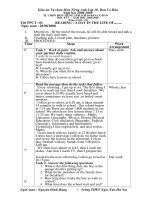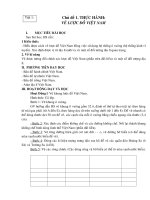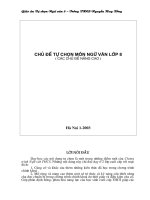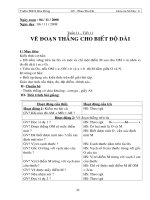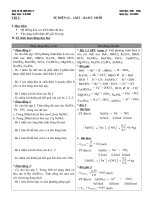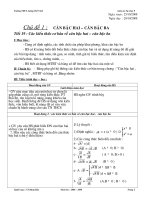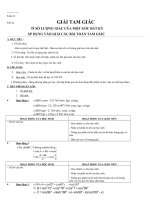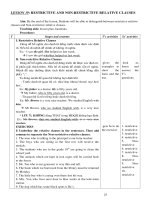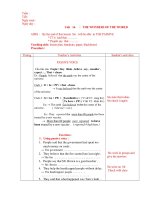giao an tu chon 10(NC) HKII
Bạn đang xem bản rút gọn của tài liệu. Xem và tải ngay bản đầy đủ của tài liệu tại đây (135.51 KB, 22 trang )
LESSON 19: RESTRICTIVE AND NON-RESTRICTIVE RELATIVE CLAUSES
Aim: By the end of the lesson, Students will be able to distinguish between restrictive relative
clauses and Non-restrictive relative clauses.
Teaching aids: lesson plan, handouts,
Procedure:
T Stages and contents T’s activities Ss’ activities
I. Restrictive Relative Clauses
Dùng để bổ nghóa cho danh từ đứng trước chưa được xác đònh rõ.
Nếu bỏ đi mệnh đề chính sẽ không rõ nghóa.
Ex: - I saw the girl. She helped us last week.
I saw the girl who/that helped us last week.
II. Non-restritive Relative Clauses
Dùng để bổ nghóa cho danh từ đứng trước đã được xác đònh rõ, là
phần giải thích thêm. Nếu bỏ đi mệnh đề chính vẫn rõ nghóa. Mệnh
đề này thường được tách khỏi mệnh đề chính bằng dấu phẩy “,”.
Ta dùng mệnh đề quan hệ không hạn đònh khi:
- Trước danh từ quan hệ có: this/ that /these/ those/ my/ her/ his/…
Ex: My father is a doctor. He is fifty years old.
My father, who is fifty years old, is a doctor.
- Từ quan hệ là tên riêng hoặc danh từ riêng.
Ex: Mr. Brown is a very nice teacher. We studied English with
him.
Mr Brown, who we studied English with, is a very nice teacher.
* LƯU Ý: KHÔNG dùng THAT trong MĐQH không hạn đònh.
Ex: Mr Brown, that we studied English with, is a very nice teacher.
EXERCISES
I/ Underline the relative clauses in the sentences. Then add
commas to separate the Non-restrictive relative clauses.
1. The man who is talking to the principal is our form teacher.
2. The boys who are sitting in the first row will receive the medals.
3. The students who are in the grade 10
th
are going to clean the
school yard.
4. The animals which are kept in iron cages will be carried back to
the forest
5. Mr. Tan who is our gymaster is very thin and tall.
6. The book which we borrowed from the library must be returned by
Monday
7. The little boy who is crying over there lost his way.
8. Mrs. Van who lives next door to Hoa works at the television
station.
9. The dog which has some black spots is Ba’s.
10. My mother bought the shoes which were made from Hong Kong.
-gives the
examples to
show the form
and the use.
-gets Ss to do
the exercise.
-look at,
listen and
answer the
T’s questions.
1. restrictive
2. restrictive
3. restrictive
4. restrictive
5. Non-
restrictive
6. restrictive
7. restrictive
8. Non-
restrictive
9. Non-
restrictive
10. restrictive
II/ Combine the two sentences by using a relative clause. Some
clauses need commas, some do not:
1. The lady is a famous writer. You met her at the party last night.
-asks Ss to
1. who(m)
25
2. The child enjoyed the chocolates. Her mother bought them from
France.
3. Dr Oley is our family’s dentist. He is a popular dentist in the city.
4. They drank a lot of Coke. It is diet Coke.
5. The river is Sai Gon River. It flows through Ho Chi Minh City.
6. The girls are performing the play. They rehearsed it yesterday.
7. Their parents are anxious about their children. The children come
back late.
8. The lecturer is my uncle. He gave an interesting talk on TV last
night.
9. The student kept talking about the project. It was done last week.
10.Mr. Phong hasn’t come yet. He is supposed to be at the meeting.
combine.
-gets
feedback.
2. which
3. who
4. which
5. which
6. which
7. who
8. who
9. which
10. who
LESSON 20: PASSIVE VOICE
Aim: By the end of the lesson, Students will be able to review and change the sentences into the
passive voice. .
Teaching aids: lesson plan, handouts, paper.
Procedure:
T Stages and contents T’s activities Ss’ activities
1. Form:
Ex: (A) She arranges the books on the shelves every weekend.
S V O
(P) The books are arranged on the shelves (by her) every weekend.
S be V3/ed by O
Active: S + V + O + …….
Passive: S + be + V3/ed + (by O) + ……
2. Rules
Khi đổi từ chủ động sang bò động, ta chú ý các bước sau:
a. Xác đònh S (Chủ từ), V (Động từ), O (Túc từ) và thì của động
từ trong câu chủ động.
Ex: (A) She arranges the books on the shelves every weekend.
S V1 O
b. Đem O lên làm S, chuyển S xuống làm O đặt sau by.
Ex:(P)The books are arranged on the shelves (by her) every weekend.
S by O
c. Thêm động từ to be (phù hợp với thì của động từ trong câu chủ
động), và chuyển động từ chính sang V3/ed.
Ex:(P)The books are arranged on the shelves (by her) every weekend.
be V3/ed
3. Notes:
a. Trong trường hợp có liên từ and và giới từ of, ta phải xác đònh
đầy đủ chủ từ hoặc túc từ khi chuyển đổi.
-gives the
example to
explain the
form.
-helps Ss to
show the rules
to change.
-look at and
listen.
-take notes
when
necessary.
Ex:- Active: He and I see the film
Passive: The film is seen by him and me.
26
- Active: He bought a box of chocolates last week
Passive: A box of chocolates was bought last week.
b. Trong câu bò động: by O luôn đứng sau adverbs of place (trạng từ
chỉ nơi chốn) và trước adverbs of time (trạng từ chỉ thời gian).
Ex:(P)The books are arranged on the shelves (by her) every weekend.
adv of place by O adv of time
c. Trong câu bò động, ta có thể bỏ: by people, by us, by them, by
someone….
Ex: (P): A new bridge has been built across the river (by them).
EXERCISES
Put the verbs in parentheses into the correct active or passive
voice
1. Last night my favorite program________________ (interrupt) by a
special news bulletin.
2. When I______________ (arrive) at the airport yesterday,
I______________ (meet) by my cousin and a couple of friends.
3. Kim______________ (write) this composition last week. That one
_____________ (write) by Phi.
4. I don’t have my bicycle today. It’s with the repairman.
It______________ (repair) right now.
5. Someone has bought the small lot behind my house and a new
house_______________ (build) on it next year.
6. A: Do you understand the explanation in the book?
B: No, I don’t. I_______________ (confuse).
7. A: When____________ your bike_______________ (steal)?
B: Two days ago.
8. A:__________ you_____________ (pay) your electricity yet?
B: No. I haven’t. but I’d better pay it today. If I don’t, my electricity
supply ______________ (shut off) by the power company.
9. A: Did you hear about the accident?
B: No. What________________ (happen)?
A: A bicyclist_____________ (hit) by a taxi in front of the dorm.
B: ___________ the bicyclist______________ (injure)?
A: Yes. He_______________ (take) to City Hospital.
10. The Eiffel Tower_____________ (be) in Paris, France.
It_____________ (visit) by millions of people every year.
It_______________ (design) by Alexandre Eiffel (1832-1923).
It_______________ (erect) in 1889 for the Paris exposition. Since that
time, it_______________ (be) the most famous landmark in Paris.
Today it______________ (recognize) by people throughout the world.
-gets Ss to do
the exercise.
-has Ss give
the answers.
1. was
interrupted
2. arrived/ was
met
3. wrote/ was
written
4. is being
repaired
5. will be built
6. am
confused
7. was…stolen
8. Have paid?/
will be shut
off
9. happened/
was hit/ was…
injured/ was
taken
10. is/ is
visited/ was
designed/ was
erected/ has
been/ is
recognized
27
LESSON 21: WRITING (Write Invitations)
Aim: By the end of the lesson, Students will be able to write Invitations.
Teaching aids: lesson plan, handouts, blackboard.
Procedure:
T Stages and contents T’s activities Ss’ activities
Task 1. Work in pairs. Write as many statements of invitation as
you know.
Ex: Do you feel like…?
-
-
-
Task 2. Match the three sections of an invitation letter with
Tung’s letter.
1. Reason for invitation
2. Statement of invitation (time, date, place)
3. Request for reply.
Hi Phi
A. Just call and tell me if you can come. Oh, one more thing, we early
need you to help to carry Nga- her motorbike was stolen last week. I’m
expecting your call.
B. Nga, Kim and I are planning a motorbike trip to Lai Thieu, and we’d
very much like you to join in.
C. We’ll start early, Sunday morning at 5:30, from my place. Breakfast
will be at Kim’s parents’ house when we arrive. After breakfast, we’re
free to roam the town and explore the various orchards there. Kim’s
mother will treat us to a special lunch that she prepares. After lunch we’ll
decide whether to leave or stay until 5:00 p.m.
Bye.
Tung
1:____________ 2:_____________ 3:______________
Task 3. Work in groups. Nam wants to write a letter inviting his
aunt, who has just finished a course of Environmental Studies in
Australia, to come and talk about conservation at the weekly
meeting of his school’s club.
Now help him to write an invitation letter.
………………………………………………..……………………......
……………………………………………………..………………......
…………………………………………..…………………………......
……………………………………………….……………………......
……………………………………………..………………………......
……………………………………………….……….……………......
…………………………………………………..…………………......
………………………………………………………..……………......
………………………………………………………..……………......
……………………………………………………………..………......
Task 4. Exhibition. Stick some finished paper on the board.
-asks Ss to
write the
invitations.
-gets Ss to
read the letter
and match
with the
sections.
-asks Ss to
write the
letter of
invitation.
-sticks some
letters on the
board.
-pairwork.
1. B
2. C
3. A
-groupwork.
-look at and
compare.
28
LESSON 22: READING (Conservation)
Aim: By the end of the lesson, Students will be able to read the passages to do the exercises, make
solutions about environmental damage.
Teaching aids: lesson plan, handouts, paper.
Procedure:
T Stages and contents T’s activities Ss’ activities
Task 1. Work in pairs. Write the causes of environmental
damage.
Cutting down of trees
Task 2. Read the text below and choose the correct answer
among A, B, C or D
We are all slowly (1)………………. the earth. The seas and the rivers are
(2)…………….. dirty to swim in. There is so much smoke in the air that
(3)……………. unhealthy to live in many of the world’s cities. In one
well-known city, for example, poisonous gases (4)………………. cars
pollute the air so much that traffic policemen have (5)……………….
oxygen masks.
1. A. destroy B. destroying C. destroyed D. destruction
2. A. a B. enough C. so D. too
3. A. it is B. is C. it was D. X
4. A. in B. from C. of D. by
5. A. worn B. wear C. to wear D. wore
Task 3. Read the text and answer the questions below
Almost a hundred thousand people were killed and half a million
homes destroyed as a result of an earthquake in Tokyo in 1923. The
earthquake began a minute before noon when the people of Tokyo
were cooking their midday meals. Thousands of stoves were
overturned as soon as the earth began to shake. As a result, small
fires broke out everywhere and quickly spread. It was impossible to
use fire fighting equipment because most of the water pipes had
burst. Consequently, over ninety per cent of the damage was caused
by fire rather than by the collapse of buildings. If the earthquake had
occurred at night while people were sleeping, fewer people would
have died.
1. Where and when did the earthquake happen?
2. How many people were killed?
3. What were people doing when the earthquake happened?
4. Why was it impossible to use fire fighting equipment?
-gets Ss to
write the
causes.
-asks Ss to
read and
choose the
answer.
-makes Ss
read and
answer the
questions.
-pairwork.
1. B
2. D
3. A
4. B
5. C
-read and
answer, then
compare.
29
Causes of
environmental damage
5. What caused most of the damage, the fire or the collapse of
buildings?
Key:
1. in Tokyo in 1923.
2. a hundred thousand people.
3. cooking their midday meals.
4. because most of the water pipes had burst.
5. the fire.
Task 4. Work in groups. Write the solutions for the environmental
damages discussed in Task 1.
-gets
feedback.
-asks Ss to
write the
solutions.
-give the
answers.
-gruopwork.
LESSON 23: CONDITIONAL SENTENCE (Type 1 & 2)
Aim: By the end of the lesson, Students will be able to know and use Conditional sentence: Type 1
& 2.
Teaching aids: lesson plan, handouts.
Procedure:
T Stages and contents T’s activities Ss’ activities
I. Conditional Sentences (If Sentences): Type 1
Ex: If I finish my homework, I will go to the concert
(= I will go to the concert if I finish my homework.)
* If clause: If I finish my homework,
* Main clause: I will go to the concert
1. Form
If + S + V1….., S + will + Vo……..
2. Use
Diễn tả một điều kiện có thể xảy ra ở hiện tại hoặc tương lai.
II. Conditional Sentences (If Sentences): Type 2
1. Form
If + S + V2/ed…..., S + would/could + Vo……
(be were)
2. Use
Diễn tả một điều kiện không thể xảy ra ở hiện tại.
Ex: - If he had much time, he would help you.
(He doesn’t have much time now)
- If I were in your position, I could do that.
(I am not in your position now)
EXERCISES
I/ Delete the incorrect verb form.
1. I’ll send/ send you some information if you’ll tell/ tell me your
address.
2. If Kate will be/ is late again, she’ll lose/ loses her job.
3. You’ll be/ are sick if you’ll eat/ eat all that ice-cream.
4. There won’t be/ isn’t enough room if everyone will come/ comes.
5. If we’ll go/ go out tomorrow evening, we’ll miss/ miss that new
program on TV.
-gives the
examples to
explain the
form and the
use.
-gets Ss to do
the exercise.
-look at and
listen, answer
the T’s
questions.
1. send ;
‘ll tell
2. will be;
loses
3. are;
’ll eat
4. isn’t;
will come
5. ’ll go;
miss
30
II/ Use conditional sentence type 2 with would or could.
1. We can’t bathe in this part of river because the water is too dirty.
2. We spend too much money on electricity because we have four air
conditioners in our house.
3. I can’t write to Linh because I don’t have her address.
4. Dick often causes accidents because he drives carelessly.
5. We can’t give much help to the poor because we waste a lot of money
on unnecessary things.
Key:
1. If the water weren’t too dirty, we could bathe in this part of river.
2. If we didn’t have four air conditioners, we wouldn’t spend too much
money on electricity.
3. If I had Linh’s address, I could write to her.
4. If Dick didn’t drive carelessly, he wouldn’t often cause accidents.
5. If we didn’t waste a lot of money on unnecessary things, we could
give much help to the poor.
-asks Ss to
rewrite.
-corrects
-use
conditional
sentence:
Type 2.
-take notes.
LESSON 24 : CONDITIONAL SENTENCE (Type 3)
Aim: By the end of the lesson, Students will be able to review and use Conditional sentence: Type
3.
Teaching aids: lesson plan, handouts, paper.
Procedure:
T Stages and contents T’s activities Ss’ activities
* Conditional Sentences (If Sentences): Type 3
1. Form
If + S + had + V3/ed….., S + would/could + have + V3/ed…..
2. Use
Diễn tả một điều kiện không thể xảy ra trong quá khứ.
Ex: If we had studied hard last year, we would have got good marks.
(We didn’t study hard last year and we didn’t get good marks)
* Notes
1. Unless: “If … not” có thể được thay bằng “UNLESS” (trừ phi):
Ex: - We will be late if we don’t hurry.
We will be late unless we hurry.
- If I have time, I’ll help you.
Unless I have time, I won’t help you.
2. Inversion: Bỏ IF trong 3 loại câu điều kiện (phải có đảo ngữ
với SHOULD/WERE/HAD):
Ex: - If it should be necessary, I will go.
Should it be necessary, I will go.
Ex: - If I were rich, I would buy a new car.
Were I rich, I would buy a new car.
Ex: - If you had asked me, I would have told you the answer.
Had you asked me, I would have told you the answer.
-gives the
examples to
explain the
form and the
use.
-look at and
listen, answer
the T’s
questions.
3. Một số từ/cụm từ có thể thay cho IF với nghóa tương đương:
provided that; so(as) long as (miễn là); in case (trong trường hợp); on
31
